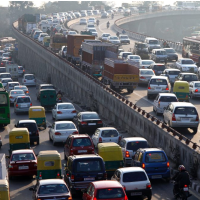India Launches Air Quality Index, But Tackling Pollution Needs Tough Choices
 Traffic in New Delhi (photo: IANS)
Traffic in New Delhi (photo: IANS)
The environment ministry has launched a National Air Quality Index that will give real time information of air quality, to put pressure on local authorities to take concrete steps for reducing pollution.
The index will rank 66 Indian cities and provide associated health risks in a color-coded manner that can be understood by everyone. The move, officials say, could raise public awareness of the issue.
“The index is meant to alert us, but it has to also drive us to action,” said Ashok Lavasa, secretary of the ministry of environment, forest and climate change, at the launch on Friday.
In May this year, a report by a Yale University research team showed that India ranked 174th of 178 countries in air quality, close to China and Pakistan. Officials had at that time dismissed the report as “biased.”
Then came the World Health Organization, which claimed that New Delhi’s air quality is the worst in the world, and that its annual average concentration of small particles is almost three times that of Beijing.
There has been increasing concern over rising pollution in cities due to vehicular pollution. With air pollution the fifth-largest killer in the country, environmentalists have called for stricter fuel emission standards.
In response the environment ministry launched its own index.
“There was a lot of hue and cry over claims made by some foreign people at that time that the air quality in Delhi was the worst,” said Susheel Kumar, chairman of the Central Pollution Control Board. “We want to come out with our own national air quality index. Our team of experts are second to none in the world.”
But producing credible pollution data is easier said than done.
According to the Economic Times, state pollution control boards routinely under-report data for fear of looking bad; use dodgy machines that generate unreliable data; and routinely use imported machines that do not work well in local conditions.
This means that while the index may assuage local officials miffed at unfavourable foreign reports, it will not actually help the pollution come down. For that to happen curbs will have to be imposed on the sale of cars, a congestion charge applied in the centre of New Delhi, and parking charges increased – all of which are hot potatoes politically.
It’s so much easier to just set up your own index so that at least the pollution levels can look good.
- Karan Singh
To Learn More:
Why India’s numbers on air quality can’t be trusted (by M Rajshekhar, The Economic Times)
National Air Quality Index to monitor air quality (by Mayank Aggarwal, DNA)
India launches its own Air Quality Index. Can its numbers be trusted? (by Rama Lakshmi, The Washington Post)
WHO report shows Delhi, not Beijing is worst in air pollution (FirstPost)
- Top Stories
- Controversies
- Where is the Money Going?
- India and the World
- Appointments and Resignations
- Unusual News
- Latest News
- India College Chain’s Expansion into U.S. Draws Opposition from Massachusetts Officials over Quality of Education
- Milk Shortages in India Tied to Release of New Movies Featuring Nation’s Favorite Stars
- Confusion Swirls around Kashmir Newspaper Ban in Wake of Violent Street Protests
- Polio-Free for 5 Years, India Launches Vaccine Drive after Polio Strain Discovery
- New Aviation Policy Could Increase Service, Lower Ticket Prices






Comments